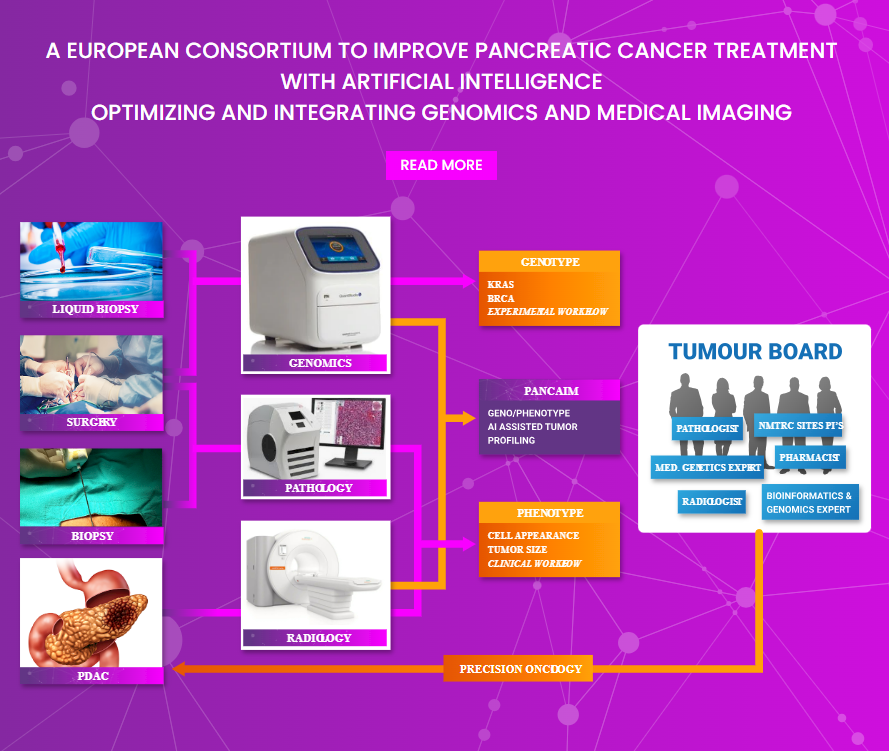
PANCAIM: Revolutionary AI Platform Transforms Pancreatic Cancer Detection & Treatment

Industry
Healthcare
Challenge
Pancreatic cancer will soon be the second leading cause of cancer-related death in Western societies. Potential new detection techniques and treatments are emerging, but challenges remain: for these new tools to be effective, it will be necessary to find patients earlier, select the right drug for the patient, and better follow the therapy.
Results
Ongoing: Collective Minds has developed the PANCAIM cloud repository, which collects and hosts a wide range of imaging, genomics, and clinical PDAC data and will be sustained for further research and clinical applications.
Key Product
Research

PANCAIM consortium
- Radboud University Medical Centre Nijmegen (RUMC)
- Karolinska Institutet (KI)
- Oslo universitetssykehus HF (OUS)
- Spanish National Cancer Research Center (CNIO)
- University of Glasgow (UOG)
- Collective Minds (CM)
- Siemens Healthineers (SHL)
- The Hyve (HYVE)
- AMIRES (AMI)
The Urgent Need for Precision Solutions in Pancreatic Cancer Treatment
Pancreatic cancer, the deadliest cancer in Europe with a median survival of just 4.6 months, is rising in incidence and is projected to become the second leading cause of cancer-related death in Western societies. While novel immunotherapeutic drugs and advanced genomic tools like whole-genome sequencing and liquid biopsies offer promise, treatment remains limited by the challenge of matching drugs to patients' diverse tumor phenotypes, and current research in genomics, pathomics, and radiomics lacks sufficient integration and clinical impact.
Harnessing Multi-Modal AI to Revolutionize Pancreatic Cancer Diagnosis and Research
PANCAIM, an EU H2020-funded research and innovation project, exploits the power of multi-modal Artificial Intelligence (AI) to tackle these challenges.
PANCAIM builds on four key concepts of AI in Healthcare: expert clinical expertise, high amounts of carefully documented real-world data, AI experts, and MedTech companies to bring AI to healthcare.
PANCAIM aims to be the first to optimize and integrate pancreatic cancer genomics, imaging phenomics, and clinical parameters using artificial intelligence (AI).
Collective Minds has developed the PANCAIM cloud repository, which collects and hosts a wide range of imaging, genomics, and clinical PDAC data and will be sustained for further research and clinical applications.
Real-World AI Impact: Early Cancer Detection and Clinical Integration at Scale
An intermediate milestone for the project is to develop uni-modal AI applications that, in a later stage, will be integrated and thoroughly validated.
In year 2, the first AI unimodal AI algorithm was developed and published and has been demonstrated to detect small cancers on CT imaging that can easily be overlooked even by experienced radiologists. PANCAIM has now exclusively implemented this AI algorithm via the teamplay digital health platform, a cloud platform owned by project partner Siemens Healthineers, which is already in use at thousands of hospitals worldwide.
The first AI-algorithm developed within the PANCAIM project was used on a real, new pancreatic cancer case at the Karolinska institute. With teamplay’s novel secure and privacy-preservering edge computing approach, the sensitive data of cancer patients stays within the hospital, paving the way towards widespread validation of the PANCAIM AI-algorithms in clinical routine settings.
After 2.5 years of collaboration this first real application is a significant milestone for the project and pancreatic cancer research as a whole.
PANCAIM will now focus on upscaling unimodal AI algorithms, including for pathology and genomics, drive forward the development of multimodal AI models and start the clinical validation process.
The ultimate objective is to implement these algorithms routinely in the clinical workflow for pancreatic cancer diagnosis and therapy monitoring, offering AI-based decision-making support to clinicians.

.png?width=1280&height=1280&name=eucan%20image%20case%20study%20image%20(1).png)